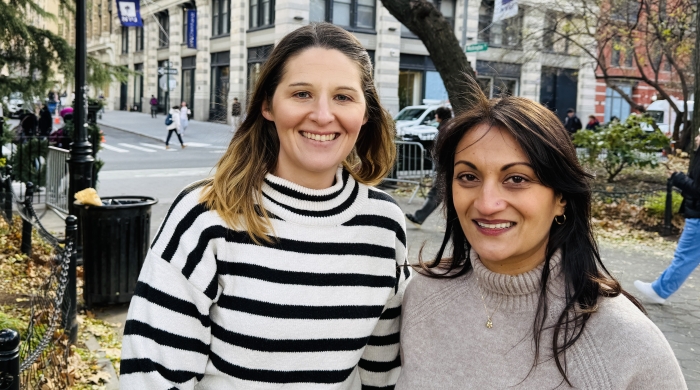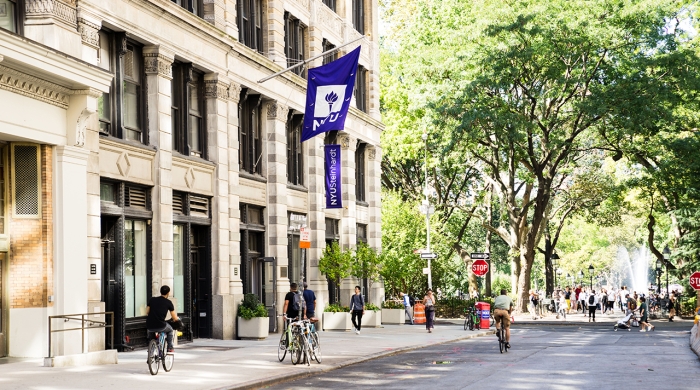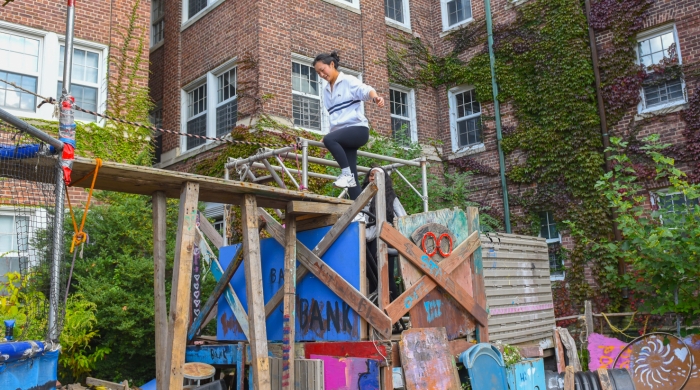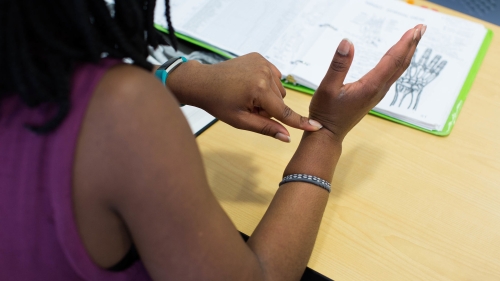Gerald Voelbel’s case documents a rare complication from cancer that triggered brain damage impairing eye function.
In February 2019, Gerald Voelbel, an associate professor of cognitive neuroscience in NYU Steinhardt’s Department of Occupational Therapy, woke up with a migraine, double vision, and poor balance and coordination. As someone accustomed to studying the brain and rehabilitating patients with cognitive issues, he suddenly found himself in the patient’s chair.
When bloodwork and brain imaging didn’t reveal any clues, doctors performed a lumbar puncture (known as a spinal tap) and found elevated protein in his cerebrospinal fluid—an indicator of brain dysfunction—that suggested an autoimmune response. Following this lead, Voelbel was diagnosed with non-Hodgkin lymphoma, which had triggered an autoimmune attack on his cerebellum, destroying cells responsible for coordination.
The culprit was identified as a novel antibody (RGS8) in the spinal fluid that reacts with lymphoma cancer cells, resulting in double vision. While there have been rare cases of lymphoma patients experiencing severe, progressive cerebellar damage, he is the first with this particular antibody to have presented predominantly with non-progressive double vision and mild imbalance.
Voelbel’s case study is published in the journal The Cerebellum.
“I have been doing clinical and neurorehabilitation research for more than 20 years. I never thought I would be the patient,” says Voelbel. “This experience has brought me a profound sense of empathy and a deeper understanding of the lived experience. It has renewed my energy and commitment to making neurorehabilitation more compassionate and effective."
When he began experiencing issues with his vision and coordination, he sought out the expertise of Janet Rucker, MD, a neuro-ophthalmologist at NYU Langone Health. After initial treatments did not improve his symptoms, Rucker sent a sample of Voelbel’s spinal fluid to the Mayo Clinic, where researchers were studying rare immune responses from cancers through biomarkers. Their testing enabled Rucker to diagnose Voelbel with paraneoplastic neurologic syndrome (PNS), an extremely rare autoimmune disorder affecting the nervous system that presents as a complication from cancer that is typically unknown at the onset of neurological symptoms.
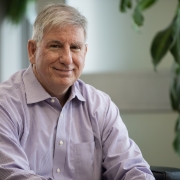
This experience has brought me a profound sense of empathy and a deeper understanding of the lived experience. It has renewed my energy and commitment to making neurorehabilitation more compassionate and effective.
“After initial normal blood work and brain imaging, it is important to consider extending the diagnostic work up to include a lumbar puncture, as it can guide the diagnostic work up towards achieving the ultimate diagnosis,” says Rucker. “Autoimmune neurology is an ever-expanding area of knowledge in the field, and through collaboration with clinicians and scientists in different disciplines and persistence when diagnosis is unclear, accurate neurological diagnoses can be established and underlying hidden cancers can be detected and treated.”
Following administration of rituximab monoclonal antibody (a targeted cancer drug) and chemotherapy to treat his lymphoma by his oncologist, Andrew Evens, DO, MBA, MSc, at the Rutgers Cancer Institute and RWJBarnabas Health, Voelbel’s lymphoma was declared in remission in December 2019. Evens collaborated closely with Rucker throughout Voelbel’s care.
While his ocular damage and coordination have stabilized, and his lymphoma remains in remission today, he continues to experience chronic double vision, migraines, and pain when standing for prolonged periods.
“As a cognitive neuroscience professor, I share my journey with my students and others so they can learn from my challenges and understand the role of the brain and the impairments caused by the paraneoplastic neurologic syndrome,” Voelbel says.
The article in The Cerebellum was authored by Ruben Jauregui, NYU Grossman School of Medicine; Andrew Evens, Rutgers Cancer Institute, New Brunswick; Anastasia Zekeridou, Mayo Clinic; Claude Steriade, NYU Grossman School of Medicine; Todd Hudson; NYU Grossman School of Medicine; Gerald Voelbel, NYU Steinhardt; Steven Galetta, NYU Grossman School of Medicine; and Janet Rucker, NYU Grossman School of Medicine.
Press Contact
(646) 469-8496
Related Articles
Two Occupational Therapy Faculty Start Award-Winning Home Accommodations Business
Ideal Home Innovations helps meet clients’ physical, sensory, and/or cognitive needs without compromising the décor of their homes.
AOTA Inspire 2025 Presentations by the Occupational Therapy Department at NYU
Faculty, students and alumni from the Department of Occupational Therapy at NYU will present at the AOTA Inspire 2025 Annual Conference and Expo.
Occupational Therapy's Lisa Raymond-Tolan Gets NYU TAG Grant for Play Observation
NYU Steinhardt OT students and faculty traveled this fall to The Yard, an adventure playground on Governors Island, to see how kids play in real time.
Related Programs
Related Department

Occupational Therapy
Pless Hall, 82 Washington Square East, 6th Floor
New York, NY 10003
Phone: 212-998-5825
Email: occupational.therapy@nyu.edu

